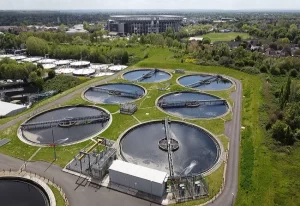Thames Water announces sewage-to-biogas project in West London

The utilities firm said the success of the gas-to-grid model established at Deephams STW in North London in 2021, where biogas is converted into biomethane to heat homes in Enfield, served as the blueprint for Mogden project.
Currently serving over 2 million customers, Mogden is the third-largest STW in the UK, and has the potential to reach and supply gas to 4,000 homes in West London.
A byproduct of the sewage treatment process is sewage sludge, which is then digested to produce biogas.
Mogden STW then generates electricity with this biogas via Combined Heat and Power (CHP) engines.
The Gas-to-Grid plant, which will be managed by gas supplier SGN, intends to take a proportion of this biogas and to ‘uprate’ it to export quality which is achieved by filtering, scrubbing and then compressing gas so it can be used as fuel for cooking and heating.
Anna Boyles, head of catchment for Mogden said: "Both Deephams and Mogden Sewage Treatment Works have set a remarkable example for environmental stewardship and innovation. The successful transformation of biogas into biomethane, heating homes across London, not only shows the dedication of our Mogden teams and SGN to delivering this project but also marks a significant step towards reducing our carbon footprint.”
Alan Midwinter, SGN senior project manager for Mogden said: "The successful commissioning of the Mogden biomethane plant is another important step towards a net zero future. SGN would like to thank all the Thames Water stakeholders and respective teams involved in the Mogden project for their invaluable input and support, it really has been a team effort. We hope that these projects highlight the potential that exists to capture and upgrade low carbon biomethane from wastewater to the benefit of the local community.”
Sewage discharge
Thames Water has faced criticism in recent years for the number of times it discharges raw sewage into rivers.
Last June, then-CEO of Thames Water Sarah Bentley resigned when it emerged that raw sewage had been pumped into London's rivers and streams for more than 7,000 hours throughout 2022.
The company has said that water bills could be increased by £14 a month to stop this activity.
Speaking at Wokingham Borough Council's overview and scrutiny management committee on 16 January, sustainability director Richard Aylard said the company intends to invest £18.7 billion in improving its network, which has experienced difficulties in containing sewage during heavy rain.
“We have got a big programme. We’ve got work planned at more than 250 of our sites but that’s over the next five years. Each of those is a multi-million-pound project," he said.
“Yes, it does involve an increase and that’s been modelled – £14 a month, it’s something like that.”
Thames Water failed to respond to Bioenergy Insight's enquiry as to whether this project will be funded by higher bills from its consumers.


















